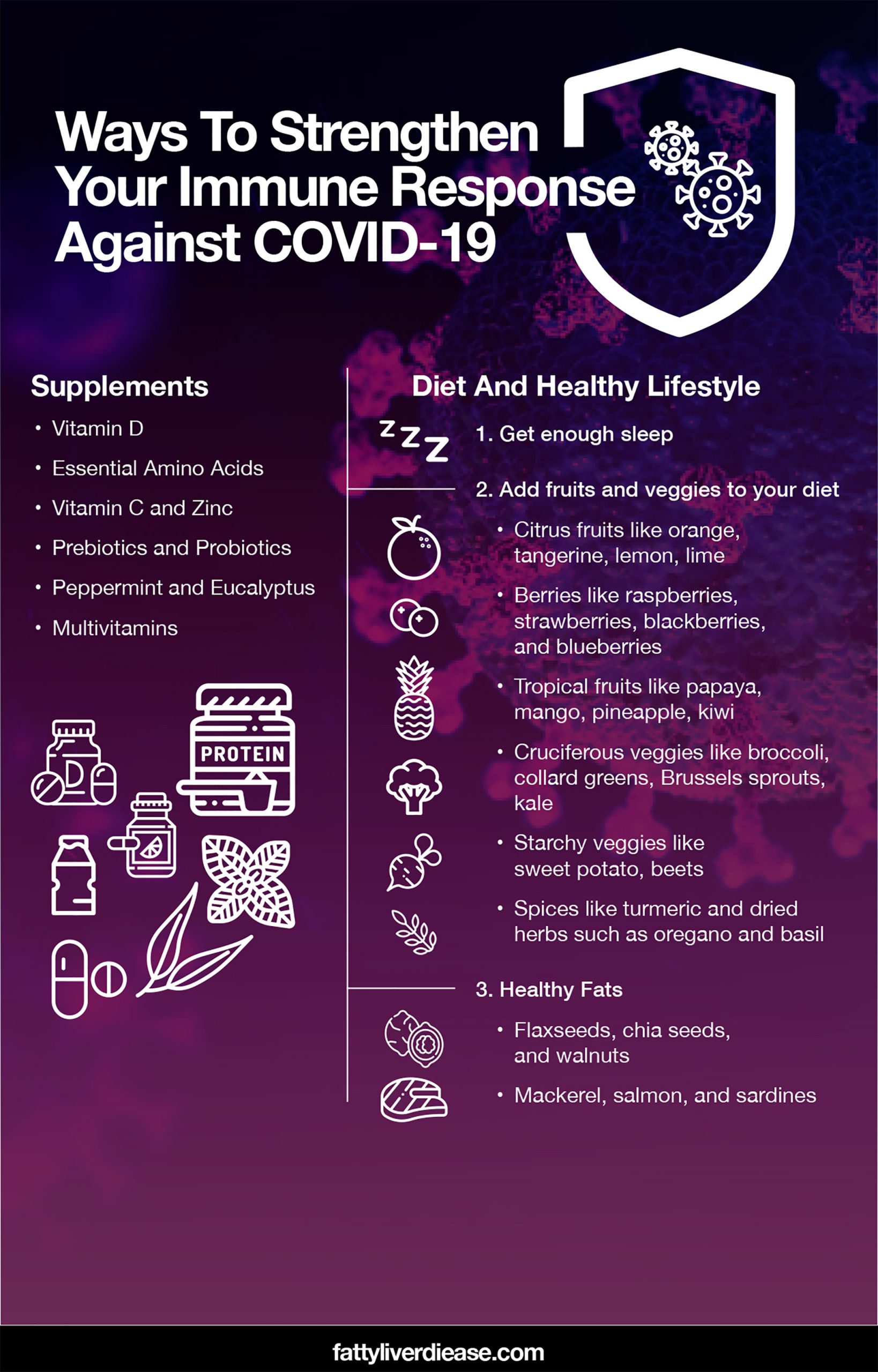A robust immune system plays an important role in warding off the common cold and the seasonal flu. While the world fights the spread of COVID-19, individuals may be able to help prevent severe symptoms by taking steps to promote a healthy immune response. Here we’ve provided tips for equipping your body with tools to fight off invading pathogens that cause infection and disease.
If you’re wondering how to boost immune system response against the novel coronavirus, you’ve come to the right place. Read on to learn about immune system supplements, protective foods, and herbal remedies.
1. Vitamin D
Getting enough vitamin D is crucial for fortifying your body’s immune system response. The effects of vitamin D on the immune system are two-fold. First, vitamin D strengthens the immune system to launch a robust attack against infectious agents like viruses and bacteria.
At the same time, vitamin D ensures that the immune system’s response is proportionate to the foreign microorganisms. Inadequate levels of vitamin D exacerbate inflammation throughout the body. Excessive immune reactivity may play a role in severe COVID-19 infections, especially among younger people. Moreover, an inflammatory immune response is also implicated in a host of autoimmune diseases like multiple sclerosis and lupus. Anti-inflammatory dietary compounds and supplements can allow for an immune response that matches the infection without creating an excessive immune response that damages body tissues more than the virus itself.
So, how do we get enough vitamin D? Getting sufficient amounts of vitamin D is more difficult than you might think. Unlike most vitamins that we usually get in our diet, vitamin D is not naturally present in foods that make up the human diet. The only naturally rich sources of vitamin D are fish like mackerel and salmon. Other commonly consumed foods such as milk, cheese, and cereals have been fortified with vitamin D to help prevent deficiency in the population.
The body produces the most vitamin D in response to sun exposure. Getting at least 15 minutes of sun exposure per day is necessary for a light-skinned person to produce ideal levels of vitamin D. An individual with a darker skin tone may need 45-60 minutes of sun exposure in order to generate the same amount of vitamin D.
However, even if you’re not clinically deficient in vitamin D, you may have insufficient levels to promote optimal immune system health.
Beyond serving as immune system support, vitamin D also provides numerous other health benefits such as supporting muscle development and metabolic function. The best way to ensure that your body is getting enough vitamin D is through supplementation. Choose vitamin D3 supplements that are paired with calcium and magnesium, to enhance absorption and promote bone health.
2. Essential Amino Acids
Amino acids are compounds that comprise protein. Amino acids are categorized as essential or nonessential, based on their necessity to be consumed in our diets. While the body can produce nonessential amino acids through biological processes, we must consume all essential amino acids in our diet. Essential amino acids are used throughout the body to synthesize muscle, build neurotransmitters, and produce enzymes.
During periods of stress, illness, or recovery, the body is utilizing essential amino acids at a rapid rate. Getting ideal ratios of essential amino acids supports the optimal function of the immune system. To make sure you’re getting enough essential amino acids in your diet, aim to eat high-quality protein each day. Nonfat dairy, lean meats, and fatty fish are excellent animal sources of protein that supply all amino acids.
When relying on plant proteins for essential amino acids, soy products are the best sources of essential amino acids. Combine plant proteins throughout the day to ensure that you’re getting the essential amino acids you need for immune support. Beans, nuts, seeds, and whole grains afford plant-sources of protein.
3. Vitamin C and Zinc
When you have the common cold, vitamin C and zinc are popular remedies to help bolster your immune system and recover faster. In many over-the-counter preparations, vitamin C and zinc are combined with echinacea to support immune function. All three ingredients are important for strengthening the immune response in the face of viral infections. Vitamin C supplements can fortify the immune system.
4. Prebiotics and Probiotics
Probiotics exert a powerful influence on the immune system through the gut. It turns out that gut health influences seemingly unrelated areas of the body, from brain health to immune health. Consuming foods rich in soluble fiber, insoluble fiber, and prebiotic compounds help feed beneficial bacteria. As the beneficial bacteria feed on fiber and prebiotics, they produce compounds that are absorbed in the digestive tract and travel through the bloodstream to other parts of the body. These compounds have anti-inflammatory properties that promote an optimal immune response.
5. Peppermint and Eucalyptus
Peppermint and eucalyptus are potent herbs for immune system response.
A study conducted by researchers from Israel examined the impact of herbal essential oils, including peppermint and eucalyptus, on the symptoms of an upper respiratory tract infection. (1) Results revealed a localized anti-inflammatory effect that helped quell symptoms of respiratory infections. (1)
One of the main soothing ingredients in herbs like peppermint and eucalyptus is menthol, which can be found in many over-the-counter cough drops.
5. Multivitamins
Taking a multivitamin can help boost your immune system. Generally, eating a variety of fruits, vegetables, whole grains, nuts, beans, lean meats, and low-fat dairy will afford a similar variety of vitamins and other micronutrients in your diet. However, during times when your immune system may be vulnerable or exposed to infection, taking a multivitamin can help fill in any gaps in your diet.
6. Getting Enough Sleep
Have you ever noticed that when you’re run down, exhausted, stressed, and sleep-deprived, you are more likely to come down with a cold? This is no coincidence and is backed by science. Research confirms the importance of sleep in regulating the immune response and developing antibodies to fight infections. (2)
None of the body systems, including the immune system, work like they should when we’re deprived of sleep. Aim for getting at least 7-8 hours of sleep each night. By getting consistent sleep, you can increase your body’s defenses by decreasing inflammation, increasing healing mechanisms, and clearing out damaged cells and waste from the body. As a result, the body’s immune system response is streamlined and can respond effectively to an invading pathogen.
7. Fruits and Veggies
Fruits and vegetables are among the most powerful foods that boost immune system function because they contain powerful antioxidants that support a healthy immune response. Eating several servings of fruits and vegetables each day support your immune system by providing loads of antioxidants. Like vitamins and minerals, antioxidants are micronutrients that are vital to supporting the proper functioning of all biological processes. Antioxidants specifically support immune function by soothing oxidative stress, which contributes to inflammation.
What is oxidative stress? On a cellular level, when your body experiences oxidative stress, biological processes are disrupted. Waste products called reactive free radicals to build up in cells. These free radicals negatively react with healthy cells and tissues and cause damage. As a result, body tissues and organs are unable to function efficiently and effectively – including the immune system. When immune system functions are bogged down by oxidative stress, the body may be overreactive and launch an inappropriate attack on infections.
The antioxidants present in fruits and vegetables are loaded with antioxidants in the form of polyphenols and carotenoids, which help combat inflammation and streamline the immune response. Though most plants are loaded with micronutrients, to get you started, here’s a list of fruits and veggies that are both tasty and packed with antioxidants.
- Citrus fruits like orange, tangerine, lemon, lime
- Berries like raspberries, strawberries, blackberries, and blueberries
- Tropical fruits like papaya, mango, pineapple, kiwi
- Cruciferous veggies like broccoli, collard greens, Brussels sprouts, kale
- Starchy veggies like sweet potato, beets
- Spices like turmeric and dried herbs such as oregano and basil
8. Healthy Fats
Healthy fats are crucial for supporting a healthy immune response. In particular, omega-3 fatty acids are a type of polyunsaturated fats that contain particularly potent anti-inflammatory properties. You can get omega-3 fatty acids from plant sources and animal sources. Flaxseeds, chia seeds, and walnuts are packed with alpha-linolenic acid (ALA), which is the plant form of omega-3 fatty acids. Fatty fish like mackerel, salmon, and sardines contain eicosapentaenoic acid (EPA) and docosahexaenoic acid (DHA) are strong anti-inflammatory agents. In addition to supporting a healthy immune response, omega-3 fatty acids also play a part in growth and repair by fortifying the membrane of all cells.
Extra Tips
During the current pandemic, it can be nerve-racking if you feel any respiratory symptoms developing. However, keep in mind that it’s still more likely that you have a cold or an allergy. Simply the stress and uncertainty caused by the coronavirus pandemic can wear down your immune system, making you more susceptible to a cold. Stress wreaks havoc on the immune system by increasing stress hormones and systemic inflammation.
As much as possible, focus on keeping calm. Promoting relaxation can actually support immune system health. Yoga, meditation, and deep breathing are soothing activities designed to center the mind and remove stressful thoughts. When you need to, turn off the news and detach for a little while to promote your own wellbeing.
Immune System Supplements and Strategies for Strengthening Your Immune System Against COVID-19: Conclusion
If you’re wondering how to strengthen immune system response against COVID-19, rest assured that there are many things you can do to equip your immune system with dietary supplements, herbs, and foods. Immune system support is important for ensuring that your immune system doesn’t underreact to an invading stimulus, allowing a virus to overrun the body. Supporting a healthy immune response also ensures that the immune system also doesn’t overreact to an invading stimulus, causing more damage than the virus itself.

References:























